广东医科大学:《英语写作》课程电子教案(PPT教学课件)05 stasis model 争议模式

※Stasis Model争议模式
※ Stasis Model 争议模式
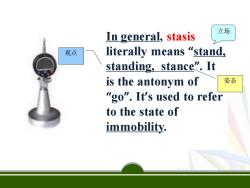
立场 In general,stasis 观点 literally means "stand, standing,stance”.It is the antonym of 姿态 “go”.It's used to refer to the state of immobility
In general, stasis literally means “stand, standing, stance”. It is the antonym of “go”. It’s used to refer to the state of immobility. 立场 观点 姿态
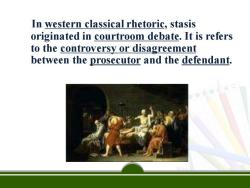
In western classical rhetoric,stasis originated in courtroom debate.It is refers to the controversy or disagreement between the prosecutor and the defendant
In western classical rhetoric, stasis originated in courtroom debate. It is refers to the controversy or disagreement between the prosecutor and the defendant
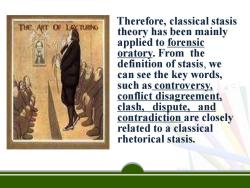
Therefore,classical stasis THC ART OF LCTURNG theory has been mainly applied to forensic oratory.From the definition of stasis,we can see the key words, such as controversy, conflict disagreement, clash,dispute,and contradiction are closely related to a classical rhetorical stasis
Therefore, classical stasis theory has been mainly applied to forensic oratory. From the definition of stasis, we can see the key words, such as controversy, conflict disagreement, clash, dispute, and contradiction are closely related to a classical rhetorical stasis
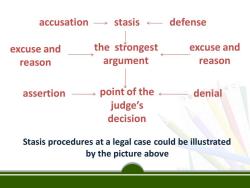
accusation stasis defense excuse and the strongest excuse and reason argument reason assertion ,→point of the←denial judge's decision Stasis procedures at a legal case could be illustrated by the picture above
accusation stasis the strongest argument assertion denial excuse and reason excuse and reason point of the judge’s decision defense Stasis procedures at a legal case could be illustrated by the picture above
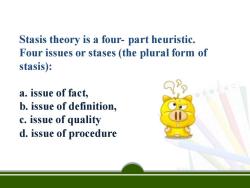
Stasis theory is a four-part heuristic. Four issues or stases(the plural form of stasis): a.issue of fact, b.issue of definition, c.issue of quality d.issue of procedure
Stasis theory is a four- part heuristic. Four issues or stases (the plural form of stasis): a. issue of fact, b. issue of definition, c. issue of quality d. issue of procedure
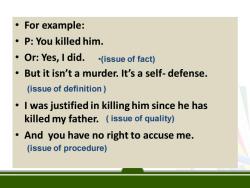
For example: 。P:You killed him. Or:Yes,I did. (issue of fact) But it isn't a murder.It's a self-defense. (issue of definition I was justified in killing him since he has killed my father.issue of quality) And you have no right to accuse me. (issue of procedure)
• For example: • P: You killed him. • Or: Yes, I did. • But it isn’t a murder. It’s a self- defense. • I was justified in killing him since he has killed my father. • And you have no right to accuse me. •(issue of fact) (issue of definition ) ( issue of quality) (issue of procedure)
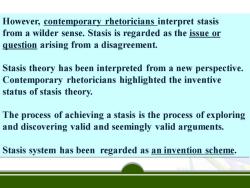
However,contemporary rhetoricians_interpret stasis from a wilder sense.Stasis is regarded as the issue or question arising from a disagreement. Stasis theory has been interpreted from a new perspective. Contemporary rhetoricians highlighted the inventive status of stasis theory. The process of achieving a stasis is the process of exploring and discovering valid and seemingly valid arguments. Stasis system has been regarded as an invention scheme
However, contemporary rhetoricians interpret stasis from a wilder sense. Stasis is regarded as the issue or question arising from a disagreement. Stasis theory has been interpreted from a new perspective. Contemporary rhetoricians highlighted the inventive status of stasis theory. The process of achieving a stasis is the process of exploring and discovering valid and seemingly valid arguments. Stasis system has been regarded as an invention scheme

Invention scheme Fact Did something happen? What are the facts? Is there a problem/issue? How did it begin and what are its causes? What changed to create the problem/issue? Can it be changed? It may also be useful to ask critical questions of your own research and conclusions: Where did we obtain our data and are these sources reliable? How do we know they're reliable?
Fact Did something happen? What are the facts? Is there a problem/issue? How did it begin and what are its causes? What changed to create the problem/issue? Can it be changed? It may also be useful to ask critical questions of your own research and conclusions: Where did we obtain our data and are these sources reliable? How do we know they're reliable? Invention scheme
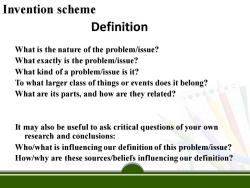
Invention scheme Definition What is the nature of the problem/issue? What exactly is the problem/issue? What kind of a problem/issue is it? To what larger class of things or events does it belong? What are its parts,and how are they related? It may also be useful to ask critical questions of your own research and conclusions: Who/what is influencing our definition of this problem/issue? How/why are these sources/beliefs influencing our definition?
Definition What is the nature of the problem/issue? What exactly is the problem/issue? What kind of a problem/issue is it? To what larger class of things or events does it belong? What are its parts, and how are they related? It may also be useful to ask critical questions of your own research and conclusions: Who/what is influencing our definition of this problem/issue? How/why are these sources/beliefs influencing our definition? Invention scheme
按次数下载不扣除下载券;
注册用户24小时内重复下载只扣除一次;
顺序:VIP每日次数-->可用次数-->下载券;
- 广东医科大学:《英语写作》课程电子教案(PPT教学课件)04 Cubing Analysis.ppt
- 广东医科大学:《英语写作》课程电子教案(PPT教学课件)03 Audience Analysis.ppt
- 广东医科大学:《英语写作》课程电子教案(PPT教学课件)02 Rhetoric in English Writing.ppt
- 广东医科大学:《英语写作》课程电子教案(PPT教学课件)01 Introduction English Writing(负责人:杨劲松).ppt
- 新概念英语第4册课文(中英文对照,共48个单元,Word版).docx
- 广东医科大学:《英语写作》课程教学资源(授课教案)17 review-Writing Effective Sentences.pdf
- 广东医科大学:《英语写作》课程教学资源(授课教案)16 research report.pdf
- 广东医科大学:《英语写作》课程教学资源(授课教案)15 rethem theme.pdf
- 广东医科大学:《英语写作》课程教学资源(授课教案)14 TEM8-5-rhetorical operation at syntactical level.pdf
- 广东医科大学:《英语写作》课程教学资源(授课教案)13 TEM8-4-argumentation.pdf
- 广东医科大学:《英语写作》课程教学资源(授课教案)12 TEM8-3-topic sentence.pdf
- 广东医科大学:《英语写作》课程教学资源(授课教案)10 TEM8-1(lecture by yan.pdf
- 广东医科大学:《英语写作》课程教学资源(授课教案)09 zero degree-syntactical level.pdf
- 广东医科大学:《英语写作》课程教学资源(授课教案)08 hypothesis and parathesis-syntactic level.pdf
- 广东医科大学:《英语写作》课程教学资源(授课教案)07 lexical deviation.pdf
- 广东医科大学:《英语写作》课程教学资源(授课教案)06 zero degree and deviation.pdf
- 广东医科大学:《英语写作》课程教学资源(授课教案)05 stasis model.pdf
- 广东医科大学:《英语写作》课程教学资源(授课教案)04 cubing analysis.pdf
- 广东医科大学:《英语写作》课程教学资源(授课教案)03 audience analysis.pdf
- 广东医科大学:《英语写作》课程教学资源(授课教案)02 rhetoric and writing.pdf
- 广东医科大学:《英语写作》课程电子教案(PPT教学课件)06 The Principle of Rhetoric - Deviation(zero degree and deviation).ppt
- 广东医科大学:《英语写作》课程电子教案(PPT教学课件)07 lexical deviaton.ppt
- 广东医科大学:《英语写作》课程电子教案(PPT教学课件)08 hypothesis and parathesis(Rhetoric at Syntactic Level).ppt
- 广东医科大学:《英语写作》课程电子教案(PPT教学课件)09 zero degree at syntactical level.ppt
- 广东医科大学:《英语写作》课程电子教案(PPT教学课件)10 TEM8作文试卷评析(主讲:颜静兰).ppt
- 广东医科大学:《英语写作》课程电子教案(PPT教学课件)11 TEM8-title(Developing Plans from Titles).ppt
- 广东医科大学:《英语写作》课程电子教案(PPT教学课件)12 TEM8-topic sentence.ppt
- 广东医科大学:《英语写作》课程电子教案(PPT教学课件)13 TEM8-argumentation Essay.ppt
- 广东医科大学:《英语写作》课程电子教案(PPT教学课件)14 TEM-rhetorical operation at syntactical level(Operation of Positive Deviation).ppt
- 广东医科大学:《英语写作》课程电子教案(PPT教学课件)15 Thematic Progression in Wirting(rheme & theme).ppt
- 广东医科大学:《英语写作》课程电子教案(PPT教学课件)16 research report.ppt
- 广东医科大学:《英语写作》课程电子教案(PPT教学课件)17 Rhetorical Operation for Effective Sentences(review-writing effective sentences).ppt
- 广东医科大学:《英语写作》课程电子教案(PPT教学课件)Zero Degree & Deviation of Lexis.ppt
- 吉林大学:《大学英语泛读》课程教学资源(试卷习题)试卷A(试题).doc
- 吉林大学:《大学英语泛读》课程教学资源(试卷习题)试卷A(答案).doc
- 吉林大学:《大学英语泛读》课程教学资源(试卷习题)试卷B(试题).doc
- 吉林大学:《大学英语泛读》课程教学资源(试卷习题)试卷B(答案).doc
- 吉林大学:《大学英语泛读》课程电子教案(PPT课件)01 Skills(主讲教师:朱丽娟).ppt
- 吉林大学:《大学英语泛读》课程电子教案(PPT课件)10 Richard Nixon’s Childhood.ppt
- 吉林大学:《大学英语泛读》课程电子教案(PPT课件)11 The Importance of Just Being There.ppt
